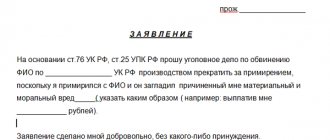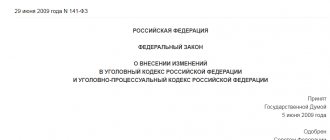On October 30, 2018, Vladimir Putin signed 376-FZ, introducing changes and additions to the Code of Criminal Procedure of the Russian Federation. The Code of Criminal Procedure of the Russian Federation has received new articles that relate to the status of the accused, in respect of whom the criminal case was separated into separate proceedings in connection with the conclusion of a pre-trial cooperation agreement.
Important!
“The need for amendments was indicated by the Constitutional Court of the Russian Federation in its Resolution No. 17-P dated July 20, 2016. The Constitutional Court of the Russian Federation noted that the status of the accused cooperating with the investigation remains uncertain in relation to the main criminal case.”
Let's consider the primary provisions of the status of a person in respect of whom the criminal case has been separated into separate proceedings in connection with the conclusion of a pre-trial cooperation agreement:
- The accused is vested with the rights provided for in Part 4 of Article 56 of the Criminal Code of the Russian Federation. In particular, a citizen has the right not to testify against himself and his immediate family, to resort to the services of an interpreter, to file petitions and lodge complaints against the actions (inactions) of investigators, prosecutors, and justice authorities, and to petition for the application of security measures. The inalienable right of any accused person is to have the assistance of a criminal lawyer.
- A citizen is prohibited from avoiding visits to an investigator or court, as well as from disclosing preliminary investigation data to third parties.
- The subject is not warned of possible liability for refusing to testify or for providing false information.
- If the subject does not comply with the terms of the concluded agreement, he will face the consequences described in Chapter 40.1 of the Code of Criminal Procedure of the Russian Federation. In particular, if after the sentencing it turns out that the subject did not provide any important information to the investigation, or provided incorrect information, then the sentence is subject to revision (Article 317.8 of the Code of Criminal Procedure of the Russian Federation).
- The interrogation and disclosure of evidence given by the subject is generally similar to similar procedural actions carried out in relation to witnesses. So, for example, before interrogation, the judge identifies the citizen, finds out his relationship to the defendant and the victim, and announces his rights and obligations. Additionally, the citizen is warned of liability for violating the terms of the pre-trial agreement.
Article 42. Victim
Article 42. Victim
[Code of Criminal Procedure] [Part One] [Section II] [Chapter 6]
. A victim is an individual to whom a crime has caused physical, property, or moral harm, as well as a legal entity in the event that a crime causes damage to its property and business reputation. The decision to recognize a victim as a victim is made immediately from the moment of initiation of a criminal case and is formalized by a resolution of the inquiry officer, investigator, judge or a court ruling. If at the time of initiating a criminal case there is no information about the person who has been harmed by the crime, the decision to recognize him as a victim is made immediately after receiving information about this person.
. The victim has the right:
- 1) know about the charge brought against the accused;
- 2) give evidence;
- 3) refuse to testify against himself, his spouse and other close relatives, the circle of whom is determined by paragraph 4 of Article 5 of this Code. If the victim agrees to testify, he must be warned that his testimony may be used as evidence in a criminal case, including in the event of his subsequent refusal of this testimony;
- 4) provide evidence;
- 5) file petitions and challenges;
- 6) give evidence in his native language or a language he speaks;
- 7) use the help of a translator for free;
 have a representative;
have a representative;- 9) participate, with the permission of the investigator or inquiry officer, in investigative actions carried out at his request or at the request of his representative;
- 10) get acquainted with the protocols of investigative actions carried out with his participation and submit comments on them;
- 11) get acquainted with the decision on the appointment of a forensic examination and the expert’s conclusion;
- 12) upon completion of the preliminary investigation, including in the event of termination of the criminal case, with all the materials of the criminal case, copy out any information from the criminal case and in any volume, make copies of the materials of the criminal case, including using technical means. If several victims are involved in a criminal case, each of them has the right to become familiar with those materials of the criminal case that relate to the harm caused to this victim;
- 13) receive copies of decisions to initiate a criminal case, to recognize him as a victim, to refuse to select a preventive measure against the accused in the form of detention, to terminate a criminal case, to suspend proceedings in a criminal case, to forward a criminal case to jurisdiction, scheduling a preliminary hearing, court hearing, receiving copies of the verdict of the court of first instance, decisions of the courts of appeal and cassation. Upon application, the victim has the right to receive copies of other procedural documents affecting his interests;
- 14) participate in the trial of a criminal case in the courts of the first, second, cassation and supervisory instances, object to the passing of a sentence without a trial in the general manner, as well as in the cases provided for by this Code, participate in a court hearing when the court considers issues related to the execution sentence;
- 15) speak in court debates;
- 16) support the accusation;
- 17) get acquainted with the protocol and audio recording of the court session and submit comments on them;
- 18) bring complaints against the actions (inaction) and decisions of the inquiry officer, the head of the inquiry unit, the head of the inquiry body, the inquiry body, the investigator, the prosecutor and the court;
- 19) appeal the verdict, ruling, court order;
- 20) know about the complaints and presentations brought in the criminal case and file objections to them;
- 21) apply for the application of security measures in accordance with part three of Article 11 of this Code;
- 21.1) on the basis of a resolution, a ruling of the court, adopted at the request of the victim, his legal representative, representative, submitted before the end of the debate of the parties, to receive information about the arrival of a person sentenced to imprisonment at the place of serving the sentence, including when moving from one correctional institution to another, about the convict’s departures outside the institution executing the sentence of imprisonment, about the time of the convict’s release from places of imprisonment, as well as to be notified of the court’s consideration of issues related to the execution of the sentence on the release of the convict from punishment, on the postponement of the execution of the sentence or on the replacement of the convict with an unserved one parts of the punishment are a more lenient type of punishment;
- 22) exercise other powers provided for by this Code.
. The victim is provided with compensation for property damage caused by the crime, as well as expenses incurred in connection with his participation during the preliminary investigation and in court, including expenses for a representative, in accordance with the requirements of Article 131 of this Code.
. Upon a claim by a victim for monetary compensation for moral damage caused to him, the amount of compensation is determined by the court when considering a criminal case or in civil proceedings.
. The victim has no right:
- 1) evade appearing when summoned by an inquiry officer, investigator, or in court;
- 2) knowingly give false testimony or refuse to give testimony;
- 3) disclose the data of the preliminary investigation if he was warned about this in advance in the manner established by Article 161 of this Code;
- 4) evade undergoing an examination, from conducting a forensic examination in cases where his consent is not required, or from providing handwriting and other samples for comparative research.
5.1. A request to obtain the information specified in clause 21.1 of part two of this article is submitted by the victim, his legal representative, representative before the end of the debate of the parties in writing. The petition shall indicate a list of information that the victim or his legal representative wishes to receive, his place of residence, email address, telephone numbers, as well as other information that can ensure the timely receipt of information by the victim or his legal representative.
. If the victim fails to appear when summoned without good reason, he may be subjected to arrest.
. For giving knowingly false testimony, the victim is liable in accordance with Article 307 of the Criminal Code of the Russian Federation, for refusing to testify, as well as for evading examination, from proceedings in relation to his forensic examination in cases where his consent is not required, or from providing handwriting samples and other samples for comparative research, the victim is liable in accordance with Article 308 of the Criminal Code of the Russian Federation. The victim is responsible for the disclosure of preliminary investigation data in accordance with Article 310 of the Criminal Code of the Russian Federation.
. In criminal cases of crimes, the consequence of which was the death of a person, the rights of the victim provided for in this article pass to one of his close relatives and (or) close persons, and in their absence or the impossibility of their participation in criminal proceedings - to one of the relatives.
. If a legal entity is recognized as a victim, its rights are exercised by a representative.
. Participation in the criminal case of the legal representative and representative of the victim does not deprive him of the rights provided for in this article.
New status of the accused: problematic issues
As we can see, the status of the person with whom the pre-trial agreement has been concluded is very close to the status of a witness. It is no coincidence that the new art. 56.1 of the Code of Criminal Procedure of the Russian Federation, which regulates this status, is placed in Chapter 8 of the Code of Criminal Procedure of the Russian Federation, which determines the status of other participants in criminal proceedings, immediately after Article 56, devoted to issues of regulation of the status of a witness (initial proposals to place the article in the chapter dedicated to participants in legal proceedings from the prosecution side, next to The article “Accused” was rejected by the legislator). For this reason, many experts informally refer to such defendants as “special witnesses.” It seems to us that this state of affairs is incorrect, since the status of a witness presupposes neutrality - he is not interested in the outcome of the criminal case, which cannot be said about the accused.
It would be more correct to designate the person in respect of whom the case has been separated in connection with the conclusion of a pre-trial agreement on cooperation as a person with two statuses: after all, such a person is initially an accused in the main case, after concluding an agreement with him and separating his case from the main one, he is still remains in the status of an accused, but in a separate criminal case, while at the same time, in the main case, his status is transformed into the status of a person in respect of whom the case has been separated in connection with the conclusion of a pre-trial agreement.
It is the impossibility of combining the incompatible in the status of a new participant, the initial presumption of impartiality and disinterest of the witness and the full interest of the accused, who cannot be prosecuted for giving false testimony, that led to the existence of disputes both before the adoption of the changes in question in the Code of Criminal Procedure of the Russian Federation, and after the law came into force. I believe that any attempts to shift the emphasis in the new status towards the witness or the accused are obviously doomed to failure: a person whose criminal case has been separated into separate proceedings in connection with the conclusion of a pre-trial agreement on cooperation, having separate signs of the status of a witness and the status of an accused, therefore no less is neither an accused nor a witness. This is precisely a new special participant in criminal proceedings with its own specific set of rights and responsibilities.
There are a couple more problematic issues.
- Nothing prevents a “special witness” from incriminating his accomplices in order to mitigate the punishment as much as possible. This practice is common in cases of economic crimes: the subject can shift part of his guilt onto an accomplice, for example, in connection with participation in fraudulent schemes. The testimony of such accused persons, obtained in compliance with the norms of the Code of Criminal Procedure of the Russian Federation, is recognized as admissible evidence on a par with the testimony of ordinary witnesses. However, as we found out earlier, the accused with whom the agreement is concluded has his own interest in the case.
- Other defendants find themselves at a disadvantage in advance - they cannot question “special witnesses” and insist that these subjects be questioned. The situation becomes more complicated if the identity of the accused, with whom a pre-trial cooperation agreement was concluded, was classified at his request.
- The procedures for interrogating the accused, with whom a cooperation agreement has been concluded, and the witness are virtually identical; The interrogation and reading of the testimony of a new participant in criminal proceedings in court are carried out according to the rules for the interrogation and reading of the testimony of witnesses and victims. Although the Constitutional Court of the Russian Federation previously stated that the rules for interrogating the accused who entered into an agreement should be different.
“It follows that the amendments made to the Code of Criminal Procedure of the Russian Federation actually worsen the position of the main accused in the case. They do not have the opportunity to fully protect their rights and interests.”
From what moment is a person considered a victim within the meaning of criminal procedure legislation?
March 31, 2021
A victim is an individual to whom a crime has caused physical, property, or moral harm, as well as a legal entity in the event that a crime causes damage to its property and business reputation. The decision to recognize a victim as a victim is made immediately from the moment of initiation of a criminal case and is formalized by a resolution of the inquiry officer, investigator, judge or a court ruling. If at the time of initiating a criminal case there is no information about the person who has been harmed by the crime, the decision to recognize him as a victim is made immediately after receiving information about this person.
It remains to clarify only a few expressions used by the legislator in the wording of Part 1 of Art. 42 Code of Criminal Procedure. As a general rule, a decision on recognition as a victim must be issued immediately “from the moment the criminal case is initiated.” When does this moment come? At first glance, the answer is simple - when a resolution to initiate a criminal case is signed. But this answer is not complete.
After all, the Code of Criminal Procedure provides for two forms of initiating a criminal case. The first, which is most often encountered, indeed, is a procedural decision on the availability of sufficient data at the disposal of the investigator (interrogating officer, etc.) indicating signs of the objective side of the crime, and provided for in Art. Art. 140 - 143 Code of Criminal Procedure of the Russian Federation. This decision must be formalized by a resolution to initiate criminal proceedings.
The second form of initiating a criminal case is provided for some private prosecution cases. It is enshrined in Parts 1 and 2 of Art. 318 Code of Criminal Procedure. We are talking about initiating a criminal case of private prosecution “by submitting an application” to the magistrate by the victim (his legal representative), and in the event of the death of the victim, by his close relative. After filing such an application, a person who has been harmed by a crime has the right to demand a ruling recognizing him as a victim. After all, after submitting the application, based on the contents of Parts 1 and 2 of Art. 318 of the Code of Criminal Procedure, a criminal case of private prosecution is considered initiated.
In accordance with Part 4 of Article 20 of the Code of Criminal Procedure of the Russian Federation, the head of the investigative body, the investigator, as well as with the consent of the prosecutor, the interrogating officer, initiate a criminal case for any crime specified in parts two and three of this article, and in the absence of a statement from the victim or his legal representative, if This crime was committed against a person who, due to a dependent or helpless state or for other reasons, cannot defend his rights and legitimate interests. Other reasons also include the case of a crime being committed by a person whose details are unknown.
Prepared by the criminal justice department of the regional prosecutor's office
Return to list



